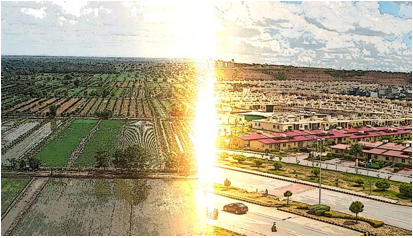INP-WealthPk
Ayesha Saba
Experts have raised concerns over the unchecked expansion of housing societies in Pakistan, warning that the unrestrained encroachment on fertile farmland could threaten food security and sustainable urban planning.

Speaking with WealthPK, Aymen Kamal, an urban development specialist at GIZ Pakistan, a leading German organization, highlighted the consequences of unregulated land conversion, stressing that Pakistan is already struggling to meet its growing food demand. “The loss of agricultural land to housing societies weakens our ability to sustain food production, increasing reliance on costly imports. This not only drives up food prices but also endangers the livelihoods of millions of farmers,” she said.
She further explained that while urban expansion is necessary, it must be strategically managed to prevent the depletion of vital farmlands. She noted that speculative real estate investments are distorting economic priorities. “Investors are acquiring vast areas of farmland and converting them into residential projects, often without adequate infrastructure or planning. This unchecked growth inflates land prices, diverts capital from the agriculture sector, and reduces farm productivity,” she explained.
She urged policymakers to enforce strict regulations to curb speculative land purchases and promote investment in sectors that drive economic stability and job creation. Speaking with WealthPK, Muzammil Hussain, a scientific officer at the National Agricultural Research Centre (NARC), emphasized that agriculture is the backbone of Pakistan’s economy, ensuring food security and sustaining rural livelihoods. However, rapid urban expansion is consuming arable land, increasing reliance on food imports, driving inflation, and exacerbating food insecurity.
He called on the government to implement land-use reforms that balance urban expansion with agricultural preservation. He advocated for zoning laws that clearly designate areas for residential, commercial, and agricultural use. Additionally, he recommended sustainable urban planning strategies, such as vertical housing developments, to minimize urban sprawl into fertile farmland. “By prioritizing vertical urban development and making use of underdeveloped urban spaces, Pakistan can meet its growing housing demands without compromising its agricultural resources,” he said.
Muzammil also highlighted the importance of fostering public-private partnerships to develop sustainable urban models that uphold environmental integrity and food security. The need for immediate and decisive action is clear. Enforcing stringent regulations, implementing land-use policies, and promoting sustainable urban development are crucial to preserving Pakistan’s agricultural heritage while addressing the nation’s evolving urbanization needs, he concluded.
Credit: INP-WealthPk










